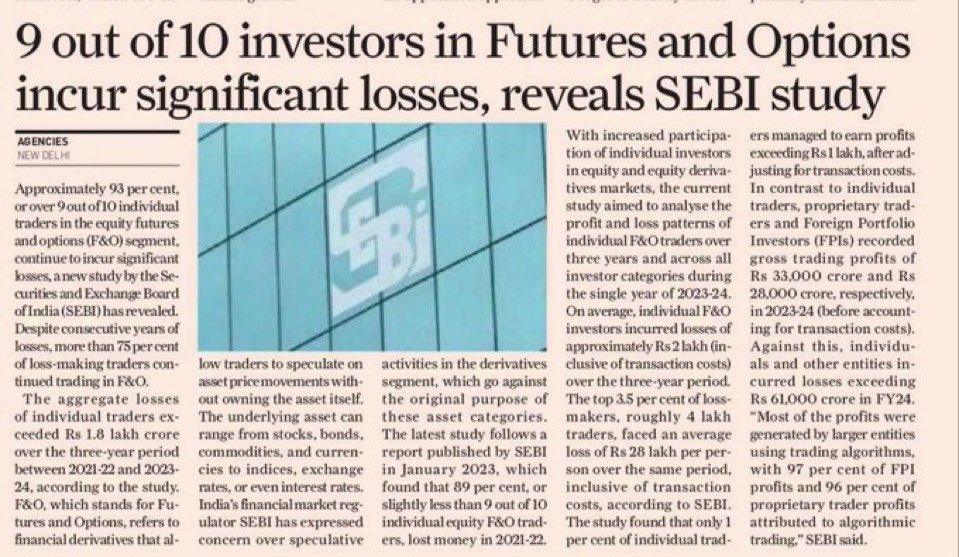
SEBI has been under pressure to regulate derivatives trading more stringently, especially as smaller investors have been increasingly drawn into the highly speculative sector, often without fully understanding the risks involved. According to Rahul Gandhi, the lack of transparency in disclosing key players in the F&O market has led to a situation where large, institutional investors are able to manipulate prices, leaving smaller traders vulnerable to significant losses. He urged SEBI to release information about who is benefitting the most from this trading, insisting that it is crucial to protect the interests of retail investors.
The futures and options market in India has grown exponentially over the last several years, especially following the introduction of newer contracts aimed at capturing short-term market trends. While this has created opportunities for quick gains, many market analysts agree with Gandhi’s assertion that a small group of large players often dominate, making it difficult for smaller investors to compete. Without proper safeguards and disclosures, they warn, small traders could be left at the mercy of market manipulations that occur behind the scenes.
Gandhi’s remarks come amidst an ongoing debate within India’s financial regulatory circles about the effectiveness of existing regulations governing F&O trading. SEBI has introduced several measures over the past few years to tighten the rules around derivatives, such as margin requirements and limits on positions. However, critics argue that these measures do not go far enough in addressing the fundamental lack of transparency regarding the actual participants in the market. Gandhi’s intervention underscores the belief that more robust disclosure requirements are needed.
The Congress leader’s call for action also highlights a broader political debate over the role of big business in India’s economy. Gandhi has often positioned himself as an advocate for small and medium enterprises (SMEs) and ordinary traders, frequently criticizing policies that he believes favor large corporations at the expense of smaller economic players. His demand for greater transparency in the F&O market fits into this larger narrative, reinforcing his broader critiques of the current financial regulatory environment.
SEBI, for its part, has not yet responded directly to Gandhi’s comments. However, sources close to the regulatory body suggest that SEBI has been looking into various ways to enhance transparency in F&O trading. One official noted that the board has been conducting internal reviews on whether more stringent reporting requirements for F&O participants could be introduced without causing market disruptions. While no concrete timeline for reforms has been set, SEBI is believed to be exploring ways to strike a balance between maintaining market liquidity and ensuring a fair playing field for all traders.
Despite SEBI’s efforts to regulate the sector, the rise of online trading platforms has made it easier for individual investors to participate in F&O trading, sometimes without adequate knowledge or preparation. The sheer complexity of F&O contracts can often lead to substantial financial losses for retail investors, who may be unaware of the significant risks involved. This has prompted further calls from various sectors of society for SEBI to implement stricter rules regarding the marketing of F&O products, especially to inexperienced traders.
Market experts are divided on the issue. Some argue that the very nature of the F&O market makes it difficult to regulate in a way that ensures equal opportunities for all participants. They point out that large institutional investors, such as mutual funds and hedge funds, naturally have more resources at their disposal, allowing them to influence market trends more effectively than individual traders. However, others agree with Gandhi that increased transparency could at least level the informational playing field, enabling smaller traders to make more informed decisions.
The broader economic context also plays a role in this discussion. With inflation and interest rates remaining volatile, many retail investors have turned to the stock market, including F&O trading, as a way to hedge against uncertainties. This influx of smaller investors into the market has heightened concerns about their financial safety, especially as they may lack the necessary expertise to navigate such complex financial instruments. Gandhi’s emphasis on protecting these traders from exploitation taps into these wider concerns about the economic security of ordinary citizens.
While Gandhi’s critique focuses primarily on the role of SEBI, it also raises questions about the responsibility of the government in overseeing the nation’s financial markets. His remarks may increase pressure on policymakers to consider additional reforms aimed at safeguarding retail investors, beyond what SEBI itself can implement. As more retail investors become involved in trading, the need for a regulatory framework that can protect them from undue risk becomes more urgent.
